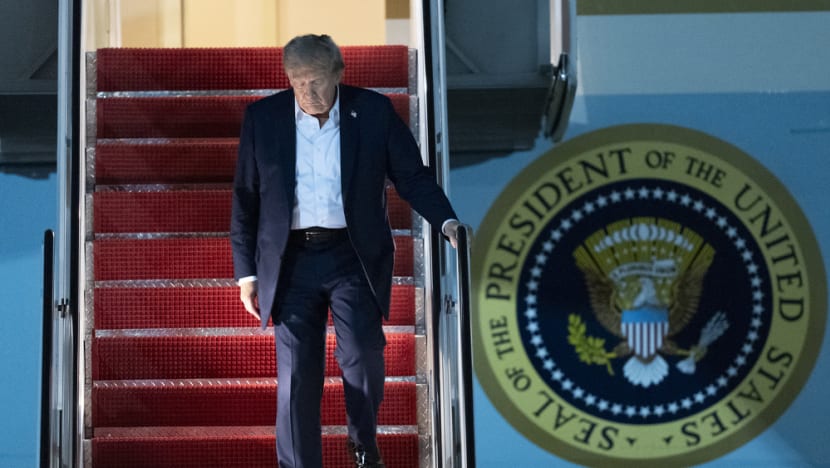Top Stories
Trump Urges Ukraine to Make Peace Deal with Russia Post-Summit

US President Donald Trump stated on Saturday, August 16, 2023, that Ukraine should pursue a peace deal with Russia, emphasizing that “Russia is a very big power, and they’re not” after a summit with President Vladimir Putin that did not result in a ceasefire. This significant shift in Trump’s position came after a nearly three-hour meeting with Putin in Alaska, marking the first US-Russia summit since the onset of Russia’s full-scale invasion of Ukraine in February 2022.
Trump expressed on his social media platform that the most effective way to conclude the ongoing conflict was through a direct peace agreement rather than a ceasefire, which he noted often fails to maintain stability. He remarked, “It was determined by all that the best way to end the horrific war between Russia and Ukraine is to go directly to a Peace Agreement, which would end the war, and not a mere Ceasefire Agreement.”
The war has resulted in the deaths or injuries of over a million individuals, with a significant number of civilian casualties, primarily among Ukrainians. Following the summit, Trump announced plans to meet with Ukrainian President Volodymyr Zelenskyy at the White House on Monday, suggesting that a successful dialogue could save “potentially millions of people’s lives.”
In response to Trump’s remarks, Zelenskyy indicated his readiness for constructive cooperation and expressed support for a trilateral meeting involving Ukraine, Russia, and the United States. He stated on social media, “Ukraine reaffirms its readiness to work with maximum effort to achieve peace.” However, Putin did not mention a meeting with Zelenskyy during his press briefing after the summit.
During an interview with Fox News’ Sean Hannity, Trump revealed that he and Putin discussed potential land swaps and security guarantees for Ukraine, stating, “I think we’re pretty close to a deal.” He urged Zelenskyy to “make a deal,” highlighting the challenging power dynamics at play.
Zelenskyy reiterated the importance of security assurances for Ukraine as a critical component of any agreement, which he believes is essential to preventing future Russian aggression. Following his call with Trump, he noted, “We also discussed positive signals from the American side regarding participation in guaranteeing Ukraine’s security.”
Prior to the summit, Trump had aimed for a ceasefire agreement and expressed disappointment at the lack of progress on this front. Putin maintained Russia’s longstanding positions on the conflict but acknowledged that Ukraine’s security must be “ensured.” He expressed hope that the discussions would lead to a constructive path toward peace.
The summit drew mixed reactions. Some commentators criticized the outcome, suggesting that Putin emerged with a diplomatic victory while Trump failed to secure any significant concessions. Wolfgang Ischinger, a former German ambassador to the United States, remarked, “Putin got his red carpet treatment with Trump, while Trump got nothing. As feared: No ceasefire, no peace.”
Despite this, some analysts noted that Trump did not completely align with Putin’s views. Tatiana Stanovaya, a senior fellow at the Carnegie Russia Eurasia Center, observed that Trump seemed to transfer responsibility to Kyiv and Europe while retaining a role for himself in negotiations.
As the war continues, both Russia and Ukraine reported ongoing military actions, with air attacks persisting on both sides. The conflict, now over three and a half years old, remains one of the deadliest in Europe since World War II.
After returning to Washington, Trump communicated with NATO leaders regarding the summit’s outcomes. Espen Barth Eide, Norway’s foreign minister, emphasized the need to maintain pressure on Russia, while Jana Cernochova, the Czech Defence Minister, characterized the summit as a missed opportunity to advance peace.
In the wake of the summit, Trump suggested that he might hold off on imposing tariffs on China related to Russian oil purchases, indicating that progress with Putin influenced his decision. He concluded a previous conversation with Putin by expressing eagerness for future discussions, stating, “Next time in Moscow,” to which Putin responded in English with a smile.
-

 World5 months ago
World5 months agoSouth Korea’s Foreign Minister Cho Hyun to Visit China This Week
-

 Business5 months ago
Business5 months agoStarling Bank Plans Secondary Share Sale, Targeting $5.4 Billion Valuation
-

 Top Stories5 months ago
Top Stories5 months agoMunsang College Celebrates 100 Years with Grand Ceremony
-

 World5 months ago
World5 months agoPAS Aims to Expand Parliamentary Influence in Upcoming Election
-

 Business7 months ago
Business7 months agoKenvue Dismisses CEO Thibaut Mongon as Strategic Review Advances
-

 Lifestyle6 months ago
Lifestyle6 months agoHumanism Camp Engages 250 Youths in Summer Fest 2025
-

 Sports6 months ago
Sports6 months agoDe Minaur Triumphs at Washington Open After Thrilling Comeback
-

 Sports7 months ago
Sports7 months agoTupou and Daugunu Join First Nations Squad for Lions Clash
-

 Top Stories7 months ago
Top Stories7 months agoColombian Senator Miguel Uribe Shows Signs of Recovery After Attack
-

 World7 months ago
World7 months agoASEAN Gears Up for Historic Joint Meeting of Foreign and Economic Ministers
-

 Health6 months ago
Health6 months agoNew Study Challenges Assumptions About Aging and Inflammation
-

 Business7 months ago
Business7 months agoOil Prices Surge Following New EU Sanctions on Russia









